Neighbors Helping Neighbors: Extension Leads Helene Recovery in Watauga
go.ncsu.edu/readext?1063461
en Español / em Português
El inglés es el idioma de control de esta página. En la medida en que haya algún conflicto entre la traducción al inglés y la traducción, el inglés prevalece.
Al hacer clic en el enlace de traducción se activa un servicio de traducción gratuito para convertir la página al español. Al igual que con cualquier traducción por Internet, la conversión no es sensible al contexto y puede que no traduzca el texto en su significado original. NC State Extension no garantiza la exactitud del texto traducido. Por favor, tenga en cuenta que algunas aplicaciones y/o servicios pueden no funcionar como se espera cuando se traducen.
Português
Inglês é o idioma de controle desta página. Na medida que haja algum conflito entre o texto original em Inglês e a tradução, o Inglês prevalece.
Ao clicar no link de tradução, um serviço gratuito de tradução será ativado para converter a página para o Português. Como em qualquer tradução pela internet, a conversão não é sensivel ao contexto e pode não ocorrer a tradução para o significado orginal. O serviço de Extensão da Carolina do Norte (NC State Extension) não garante a exatidão do texto traduzido. Por favor, observe que algumas funções ou serviços podem não funcionar como esperado após a tradução.
English
English is the controlling language of this page. To the extent there is any conflict between the English text and the translation, English controls.
Clicking on the translation link activates a free translation service to convert the page to Spanish. As with any Internet translation, the conversion is not context-sensitive and may not translate the text to its original meaning. NC State Extension does not guarantee the accuracy of the translated text. Please note that some applications and/or services may not function as expected when translated.
Collapse ▲It was almost three months after Hurricane Helene roared through Watauga County, enough time to process the incredible devastation and destruction, and enough time for cleanup and repairs to be well underway.
But as NC State Extension agents Susie Douglas and Kendra Phipps drove around the county in the middle of December, almost each bend on the twisty mountain roads brought fresh reminders of the storm’s devastation.
“There was a landslide that happened right up there,” said Douglas, the 4-H agent at Extension’s Watauga County Center. “This whole area right here got hit pretty bad. You can see the damage. There was a little white church that was wiped out. It’s not there anymore. You couldn’t even tell where it was.”
A Storm Unlike Any Other
The news reports were sobering. Helene produced as much as 20 inches of rain in 72 hours in late September. Some 1,110 buildings were damaged or destroyed. There were widespread power outages, numerous sinkholes, and road closures in every part of the county.
That only tells part of the story, though. To get a true picture of the devastation, and its impact on the people who live here, you have to be intimately familiar with the area. You have to know the before and after. You have to know someone whose home was destroyed, a farmer whose fields were flooded, whose fences were flattened, whose hay was ruined, whose livelihood was threatened, who wasn’t sure how they would make it from one day to the next.
You have to have been here when the quiet creeks that dot the landscapes became raging rivers.
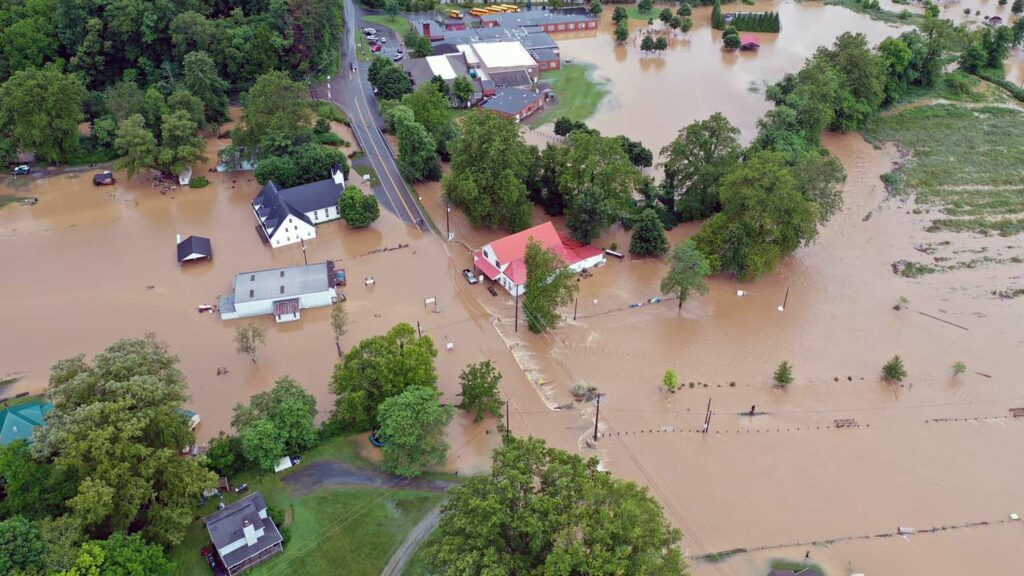
Hurricane Helene caused historic flooding in Watauga County.
“We knew that the storm was coming, but nobody knew it would be this bad,” said Phipps, Extension agent for livestock and field crops. “Everyone expected some flooding, but not to this magnitude. Not landslides. You just don’t realize how many mountain driveways go over little creeks until the little creeks take out the driveways.”
Folks who have lived in Watauga County for a while are not strangers to natural disasters. They have either experienced one, or know the stories of the big storms. There was the Flood of ‘40, and ice and snow storms over the years that knocked out power for days. Hurricanes Frances and Ivan passed over the High Country in 2004, and a microburst inundated some areas of Boone in October 2017. Localized flash flooding from heavy rains is not uncommon.
Nothing, though, prepared them for Hurricane Helene.
“We bought this place in ‘93,” said Sheila Greene, owner of North Fork Farm in Zionville, in the northwest part of the county. “The creeks got up when we had a flash flood in ‘03. It washed out the bridge. My grandmother lived there during the 1940 flood. I’ve heard all of her stories. But I never dreamed that we’d live through something like this.”
A Swift and Selfless Response
NC State Extension went to work in the immediate aftermath of the storm, doing whatever was necessary to help people in need.
“Job descriptions got set aside,” said Jim Hamilton, director of Extension’s Watauga County Center. “We knew what needed to be done and it didn’t matter what we had been working on before. Everyone went full bore into it.”
That holds true in every affected county across western North Carolina, as Extension personnel mobilized to help with disaster recovery efforts. They staffed emergency operations centers; set up and staffed sites that distributed water, food and medicine; helped coordinate airdrops of vital supplies; and worked with partners to coordinate donations and disbursement of hay, feed, fencing and other livestock supplies.
In the weeks and months after Helene, Extension employees provided more than 75,000 meals to members of the community and relief workers; made more than 350 farm visits to support recovery efforts; distributed over 17,000 large round and square bales of hay and 30,000 small square bales; and made more than 130 water quality, streambank, and landslide-related site visits to support recovery efforts.
Related: Helping Ornamental Growers Recover after Helene
In Watauga County, Phipps and Douglas were among the Extension agents on the front lines of the initial response.
Douglas lives in neighboring Wilkes County. She experienced rainfall and strong winds, but nothing like her friends and coworkers in the High Country. As soon as the storm passed she rounded up humanitarian supplies and headed up the mountain.
“I came up to see how I could help,” she said. “I brought some food and water and baby supplies and anything I could collect. That Saturday morning it was all neighbors helping neighbors dig out their roads. There was a lot of damage at first, but everyone worked together pretty quickly to put some duct tape on these fixes to get everyone what they needed.”
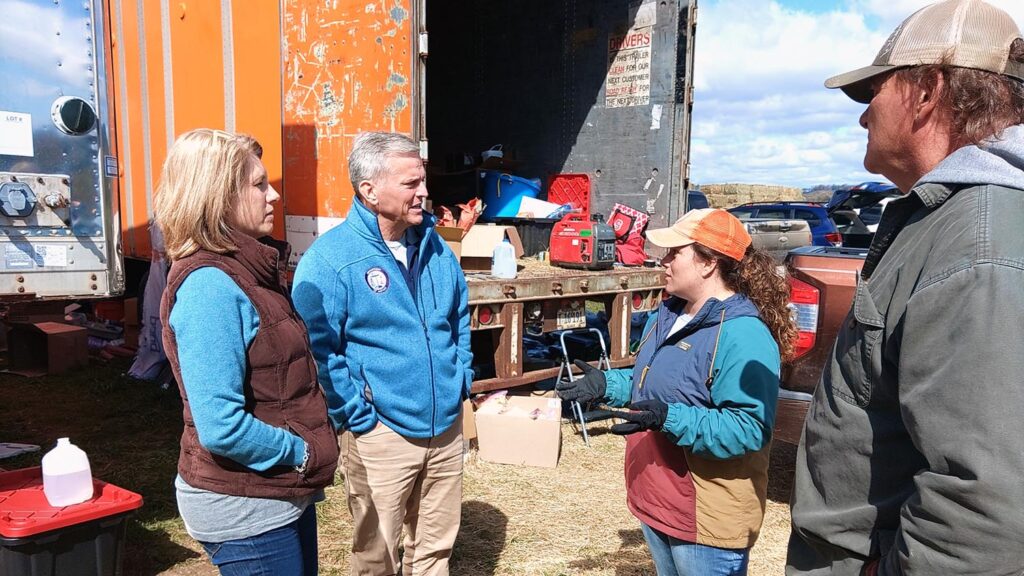
North Carolina Gov. Josh Stein and his wife, Anna, talk with agriculture agent Kendra Phipps and Rusty Henson, president of the Watauga County Cattlemen’s Association, at the site Extension established to distribute hay, fencing supplies, and other agricultural necessities.
Churches and charitable organizations including Boone-based Samaritan’s Purse quickly stepped up to organize and distribute food, water and household items, so Extension pivoted to a different kind of relief.
“Aid was flooding in,” Hamilton said. “There were distribution sites set up, and so the humanitarian end was taken care of. We decided to shift to agriculture, to see how we could help our farmers.”
Meeting Critical Agricultural Needs
The greatest amount of need soon became clear, dictated by the volume of phone calls and texts Hamilton and Phipps were receiving.
“We started getting calls,” Hamilton said. “So and so lost all their hay, so and so lost their whole hay barn, so and so lost all their fencing. So it was fencing supplies, cattle feed for the short term, and then hay for the winter months became our priorities.”
As donations began to pour in, Hamilton identified a distribution site on the less-damaged east side of the county. Phipps handled the logistics involved with the large volume of donations and Douglas was tasked with helping.
“The day after the storm, I knew that my job was going to be very different for a little while,” Phipps said. “I wasn’t really exactly sure what it was like to be an Extension agent in a disaster area. But that’s what happened.”
As a livestock and field crops expert, Phipps works directly with farmers to identify and meet their needs. Douglas provides programming for youth as a 4-H agent. Neither had “organize an agriculture relief distribution site” on their resume or in their job descriptions. But the moment called for Extension personnel to step out of their comfort zones, and Phipps and Douglas stepped up in a big way.
“Kendra and Susie have been rock stars,” said Greene, who received hay and fencing supplies. “I literally don’t know what we would have done without them and the people donating. It’s helped out tremendously.”
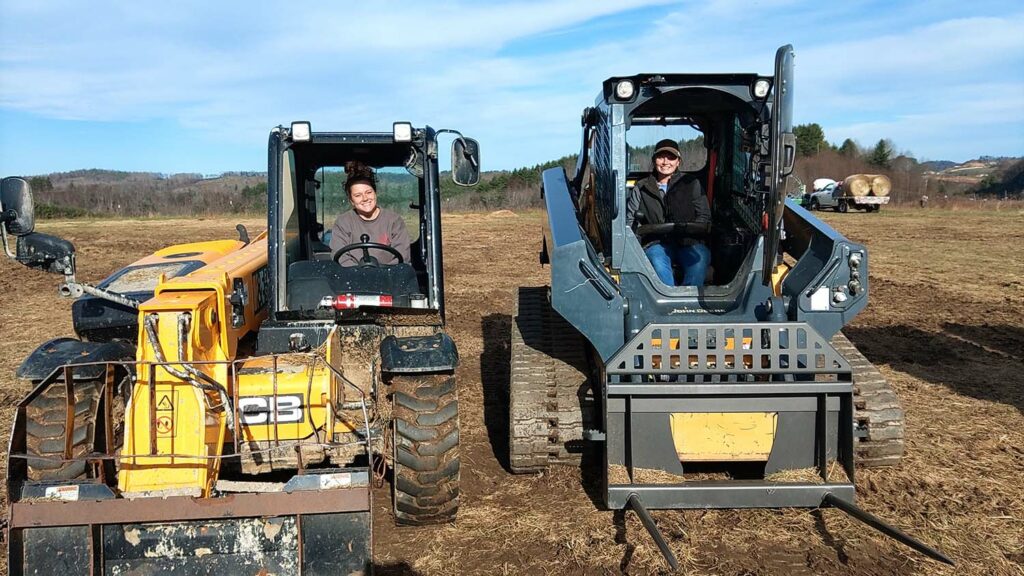
Extension agents Kendra Phipps and Susie Douglas became heavy equipment operators at the distribution site.
Communities Rally for Recovery Efforts
As news of the terrible disaster that had struck the North Carolina mountains dominated the news, people were moved to help. Donations came in from across the state and across the country, from Iowa, Pennsylvania, Ohio, Virginia, West Virginia, South Carolina, Kentucky and beyond.
Phipps had worked in Stokes County before moving to Watauga. She tapped into past contacts, and on her knowledge of technology, to help organize donations and to coordinate distributions.
“Kendra used the newer technology that some of us Luddites aren’t as familiar with,” Hamilton said. “She found a call center app program and she set up a hay hotline that immediately went into use. We got on social media and advertised it. It went in the paper and went on the radio. It was great to see how everyone was completely committed to making sure that our ag community was getting what they needed.”
Douglas, who has an animal science degree from NC State’s College of Agriculture and Life Sciences, was able to use the knowledge accrued from her university days to ensure the site ran efficiently.
“She has lots of livestock knowledge,” Phipps said. “She knew what different livestock supplies were and about feed. I didn’t have to teach her.”
Some of the hay and fencing was loaded on trucks and delivered directly to farms.
“We sent three loads on big National Guard trucks out to one of the really rural outposts pretty early on, within the first couple weeks,” Hamilton said. “They had not gotten any aid at that point.”
Farmers also came to the site to pick up the supplies they had reserved. It often was loaded by Phipps and Douglas, who became heavy equipment operators.
“I learned how to be an agent in a disaster area. So did Susie,” Phipps said. “It required a lot of people willing to help.”
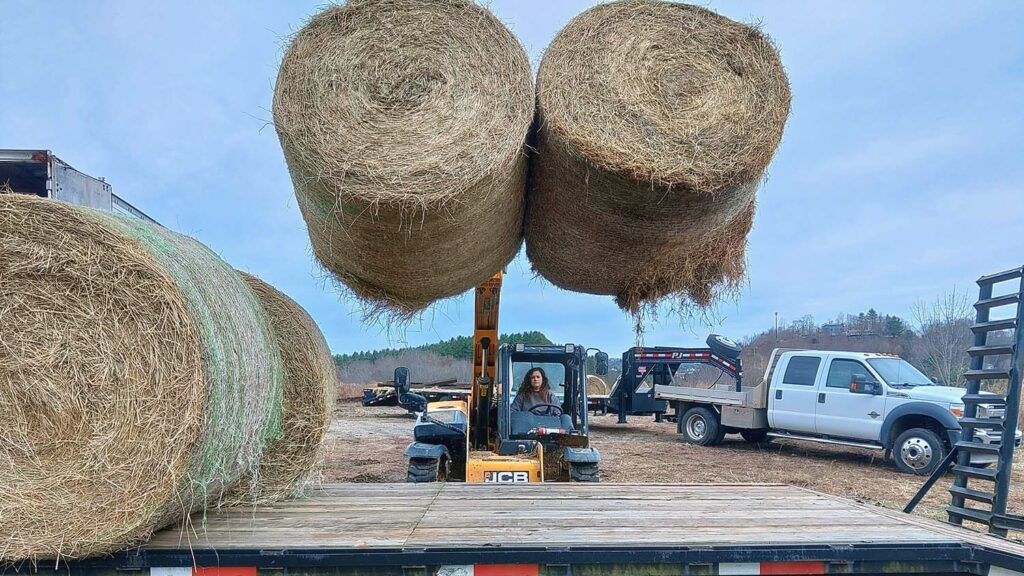
Watauga County Extension agent Kendra Phipps loads hay onto a truck.
Feed and fencing supplies were the primary focus, but other donated items were available also. The site received halters, lead ropes and other tack for horses; veterinary items including syringes; pet food; bar oil and premixed fuel for chainsaws; and hydraulic fuel and engine oil for flooded tractors.
“We got some monetary donations as well,” Phipps said. “We used those to purchase supplies when we were running short on certain things.”
Over the next several weeks, Extension distributed more than 400 tons of hay, around 75 pallets (more than 70 tons) of cow, chicken, horse and small ruminant feed, and some $50,000 worth of fencing supplies — including hundreds of t-posts, over 100 spools of barbed wire, electric wire, insulators, post-drivers, solar chargers, woven wire, railroad ties, round posts and netting wire.
Additionally, Extension facilitated Master Food Volunteers to prepare and serve meals for work crews that were clearing debris at farms.
Overcoming Pride with Gentle Persuasion
One issue was persuading people to accept help. The needs in Watauga County were real and acute, but there was some reluctance to receive the supplies.
“We heard that from a lot of farmers,” Phipps said. “We’d say we’ve got fencing supplies, we’ve got hay, come and get it. And they’d be like, no, somebody else probably needs it worse. We dealt with a lot of that.”
Sometimes people who came to the distribution site were more concerned about their neighbors than themselves. Jessica Miller, who operates Tester Dairy Farm in Zionville, frequently came to pick up fencing supplies for people who had difficulty getting out.
“We’re young and a lot of farmers are older, and they may not have the connections and networking and know how to get help,” she said. “It’s just really hard seeing your neighbors in really sad situations and you want to help them.”
That sums up the motivation of every Extension agent in the days, weeks and months after the storm. They saw needs, and they wanted to help. Even if they occasionally had to do some gentle arm twisting, as when Phipps noticed Miller not taking anything for her farm.
“She was getting stuff when she was in town and bringing it to the older farmers up here and taking care of them first,” Phipps said. “I finally had to get a little bit stern with her and be like, ‘I have this set aside for you. I know that you need it, so take it.’”

Extension agents from Watauga County, Susie Douglas and Kendra Phipps, with Jessica Miller of Tester Dairy Farms. Miller helped her neighbors in Zionville before accepting supplies from Extension’s distribution site.
Miller needed it, because like most farmers in the area she was devastated by the flooding from Helene. The small creek running through their property became a raging torrent. It spilled its banks and completely wiped out a corn field Tester Dairy Farm relies on to produce silage, the primary feed supplemental for their cows.
“I’ve seen floods before, but nothing like this,” Miller said. “Everybody in this area talks about the 1940 flood, but it was nothing like this one on our farm. We lost this field completely. We also purchase corn from neighbors across the mountain. They lost probably 80% of their corn. And so the corn that we would have gotten from them, we also weren’t able to get.”
Miller and her husband went to Tennessee to chop corn on a friend’s farm when the roads opened up. And eventually, after taking care of her neighbors, she got hay from the Extension distribution site.
“It definitely helped people in the county,” she said. “I really have no clue how all the hay needs would have been met without Extension. People in this area often have to buy hay because the lay of the land isn’t the best for farming. If we have a bad year, a drought, or if you overstock your cattle, you’re going to have to buy hay. In years prior people have had trouble finding it even when there were no problems going on.”
Related: Rebuilding Lives, Renewing Hope in Western North Carolina
Greene, the owner of North Fork Farm, also was thankful for the hay and fencing supplies she received.
Like many farmers across the county, her fences were destroyed by the floodwaters. Replacing and repairing them was a priority so she didn’t lose any cattle.
“We lease 60 acres or so and the fences are just absolutely destroyed,” she said. “It’s just a lot of rebuilding. We’ve had to play musical pastures and just rotate the cows. You’ve got to get fences up before you can move them.”
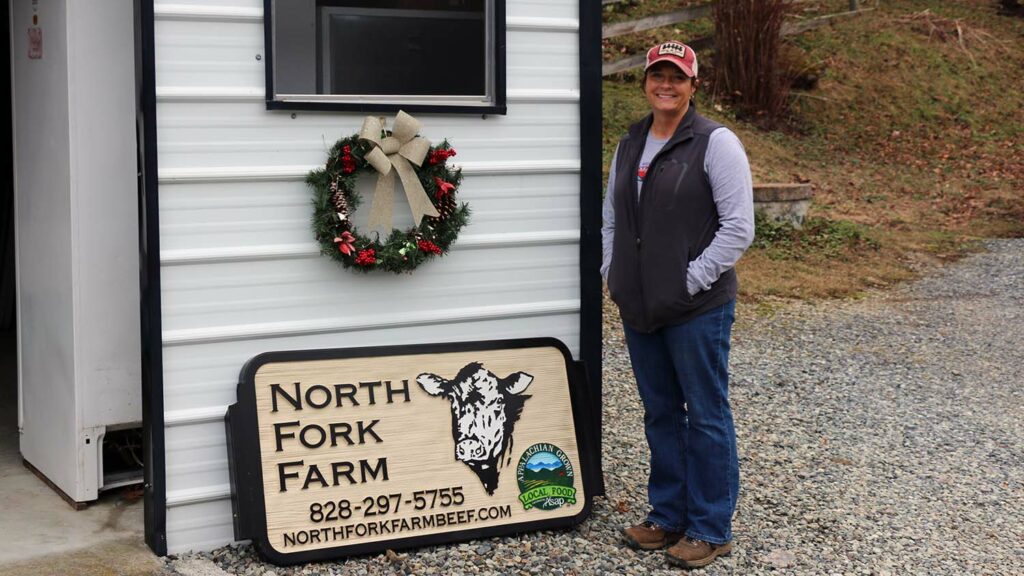
Sheila Greene, owner of North Fork Farm in Zionville, was grateful for the supplies she received from NC State Extension.
Shifting from Short-Term Relief to Long-Term Recovery
The distribution site closed in the middle of December, and Extension moved from the relief to the recovery phase.
“I feel confident we met the immediate needs of our community,” Hamilton said.
The next steps include ongoing help with fencing, connecting farmers with resources, and soil testing and mitigation in fields where floodwaters dumped inches of sand and silt.
“We’re getting that question of do I fertilize on top of the sand? Do I bring in bulldozers and push the sand away?” Hamilton said. “We know some areas are going to be impacted for years, and some will never be the same.”
Extension experts assisted with assessments on flooded bottomlands to assess soil fertility, productivity and food safety, and submitted requests for other farm supplies for crop producers to repair infrastructure damage to their vegetable operations.
Whatever programs become the focus in the upcoming months and years, Extension experts will continue to respond with research-based advice and compassion for the people they serve.
“We’re public servants first and foremost,” Phipps said. “We enter this job knowing that’s our role, to be a public servant and to give everything we have to this community to make sure that people come out the better for it.”
For Phipps, that means personal care for the livestock producers and growers in her county.
“The Extension agents that I know and respect call them ‘my farmers.’ The farmers in their county are ‘my farmers.’ And that’s what I’ve always said too,” she said. “It is like a mother hen feeling like these are the people that I have been put in this position to take care of. You have to have a lot of compassion to be an Extension agent. This adds a whole other level because it’s not like a typical day where they just need my help. They need my help because their livelihood is at risk.”
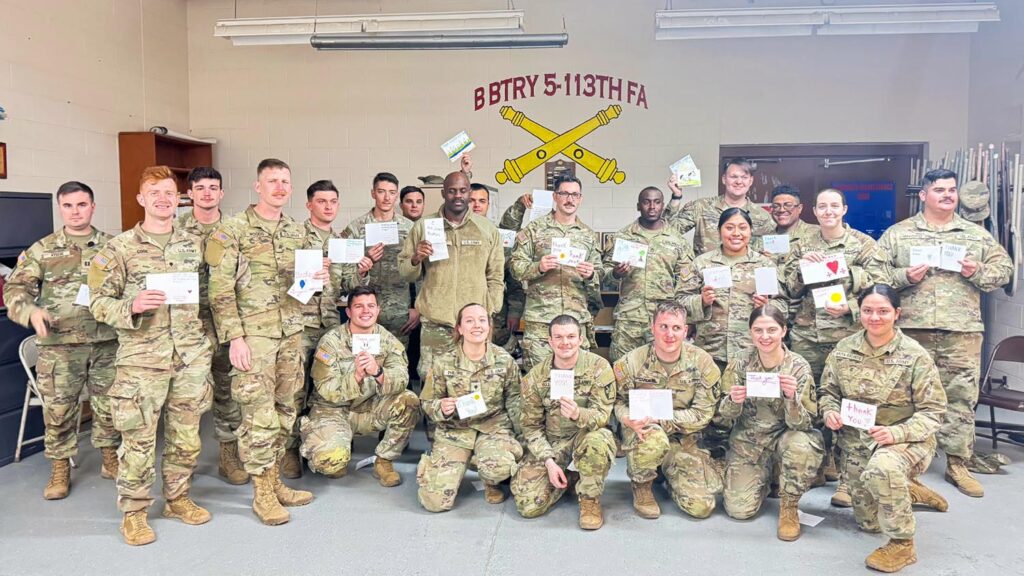
Participants in the Watauga County 4-H equine club wrote thank you cards for a National Guard troop that helped the county.
Douglas feels the same level of care and compassion for the youth and families she serves through her 4-H programming.
“It’s not just adults involved,” she said. “It’s the children too. Our program has been growing tremendously. I went from about 20 enrollments to more than 100 over the summer. It was really important to try and keep them participating and keep the kids involved.”
Programming slowed immediately after the storm, when many roads were out and when Douglas was putting in long hours at the distribution site. But as the distribution site was closing, Douglas was planning a Christmas party for the youth.
“We thought that was really important, so they could see their friends and have a little bit of normalcy,” she said.
It was a successful event, and a sign to youth and parents that they were not forgotten.
“The parents said how thankful they were to have just a place for their kids to connect and hang out,” Douglas said. “They could still be a part of the 4-H club they have come to love.”

